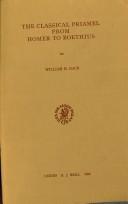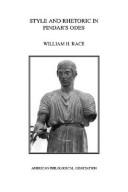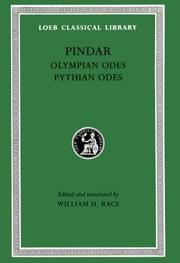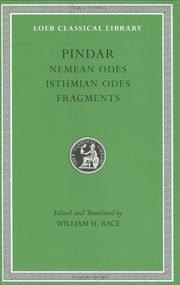| Listing 1 - 5 of 5 |
Sort by
|

ISBN: 9004065156 9004327940 9789004065154 9789004327948 Year: 1982 Volume: 74 Publisher: Leiden E.J. Brill
Abstract | Keywords | Export | Availability | Bookmark
 Loading...
Loading...Choose an application
- Reference Manager
- EndNote
- RefWorks (Direct export to RefWorks)
Classical languages --- Stilistics --- Classical poetry --- Poésie ancienne --- History and criticism --- Histoire et critique --- Priamel --- -Priamel --- Gnomic poetry --- Classical literature --- Priamel. --- History and criticism. --- Poésie ancienne --- Classical poetry. --- Classical poetry - History and criticism
Book
ISBN: 9780674996304 0674996305 Year: 2014 Volume: 1 Publisher: Cambridge, MA : Harvard University Press,
Abstract | Keywords | Export | Availability | Bookmark
 Loading...
Loading...Choose an application
- Reference Manager
- EndNote
- RefWorks (Direct export to RefWorks)
Apollonius Rhodius' Argonautica, composed in the third century BCE, is an epic retelling of Jason's quest for the golden fleece. It greatly influenced Roman authors such as Catullus, Virgil, and Ovid, and was imitated by Valerius Flaccus.
Argonauts (Greek mythology) --- Jason (Greek mythology) --- Medea (Greek mythology) --- Argonautes (Mythologie grecque) --- Jason (Mythologie grecque) --- Médée (Mythologie grecque) --- Poetry. --- Poésie --- Epic poetry, Greek --- Poetry --- Translations into English --- Argonauts (Greek mythology) in literature --- Greek poetry --- Jason (Greek mythology) in literature --- Jason --- Chasón --- Giasone --- Giasuni --- Iasōn --- Iasonas --- Iaszón --- Jasonas --- Jāsons --- Jasão --- Jaysun --- Jazon --- Jazono --- Xasón --- Yason --- Yī ā sòng --- 伊阿宋 --- イアーソーン --- יאסון --- 이아손 --- Язон --- Ясон --- Јасон --- Ἰάσων --- Ιάσονας --- جاسون --- Greek epic poetry --- Argonauts --- Golden Fleece (Greek mythology) --- Mythology, Greek --- Greek literature --- Epic poetry, Classical --- Médée (Mythologie grecque) --- Poésie --- Medea, --- Μήδεια, --- Mēdeia, --- Argonauts (Greek mythology) - Poetry --- Jason (Greek mythology) - Poetry --- Epic poetry, Greek - Translations into English

ISBN: 1555404901 155540491X 9781555404901 9781555404918 Year: 1990 Volume: 24 Publisher: Atlanta, Ga: Scholars Press,
Abstract | Keywords | Export | Availability | Bookmark
 Loading...
Loading...Choose an application
- Reference Manager
- EndNote
- RefWorks (Direct export to RefWorks)
Rhetoric, Ancient --- Rhétorique ancienne --- Pindar --- Technique --- Rhetoric, Ancient. --- Laudatory poetry, Greek --- Athletics in literature --- Games in literature --- History and criticism --- Greece --- In literature --- Technique. --- Laudatory poetry, Greek - History and criticism --- Pindar - Technique --- Greece - In literature

ISBN: 0674995643 9780674995642 Year: 1997 Volume: 56, 485 Publisher: Cambridge (Mass.): Harvard university press,
Abstract | Keywords | Export | Availability | Bookmark
 Loading...
Loading...Choose an application
- Reference Manager
- EndNote
- RefWorks (Direct export to RefWorks)
Of the Greek lyric poets, Pindar (ca. 518-438 BCE) was "by far the greatest for the magnificence of his inspiration" in Quintilian's view; Horace judged him "sure to win Apollo's laurels." The esteem of the ancients may help explain why a good portion of his work was carefully preserved. Most of the Greek lyric poets come down to us only in bits and pieces, but nearly a quarter of Pindar's poems survive complete. William H. Race now brings us, in two volumes, a new edition and translation of the four books of victory odes, along with surviving fragments of Pindar's other poems. Like Simonides and Bacchylides, Pindar wrote elaborate odes in honor of prize-winning athletes for public performance by singers, dancers, and musicians. His forty-five victory odes celebrate triumphs in athletic contests at the four great Panhellenic festivals: the Olympic, Pythian (at Delphi), Nemean, and Isthmian games. In these complex poems, Pindar commemorates the achievement of athletes and powerful rulers against the backdrop of divine favor, human failure, heroic legend, and the moral ideals of aristocratic Greek society. Readers have long savored them for their rich poetic language and imagery, moral maxims, and vivid portrayals of sacred myths.Race provides brief introductions to each ode and full explanatory footnotes, offering the reader invaluable guidance to these often difficult poems. His new Loeb Classical Library edition of Pindar also contains a helpfully annotated edition and translation of significant fragments, including hymns, paeans, dithyrambs, maiden songs, and dirges.
Athletics --- Games --- Laudatory poetry, Greek --- Jeux --- Sports athlétiques --- Poésie élogieuse grecque --- Poetry --- Translations into English --- Poésie --- Traductions anglaises --- Pindar --- Traductions en anglais --- Olympic games (Ancient) --- Poetry. --- -Games --- -Laudatory poetry, Greek --- -Olympic games (Ancient) --- Ancient Olympic games --- Olympics --- Greek laudatory poetry --- Greek poetry --- Children --- Children's games --- Games, Primitive --- Games for children --- Pastimes --- Primitive games --- Recreations --- Entertaining --- Physical education and training --- Amusements --- Play --- Sports --- Recreation --- -Pindarus --- Pindare --- Pindaro --- Πίνδαρος --- -Translations into English --- -Pindar --- Píndaro --- Pindaros --- Pindarus --- Translations into English. --- Sports athlétiques --- Poésie élogieuse grecque --- Poésie --- Laudatory poetry, Greek - Translations into English --- Olympic games (Ancient) - Poetry. --- Athletics - Greece - Poetry. --- Games - Greece - Poetry.

ISBN: 0674995341 9780674995345 Year: 1997 Volume: 485 Publisher: Cambridge (Mass.): Harvard university press,
Abstract | Keywords | Export | Availability | Bookmark
 Loading...
Loading...Choose an application
- Reference Manager
- EndNote
- RefWorks (Direct export to RefWorks)
Of the Greek lyric poets, Pindar (ca. 518-438 BCE) was "by far the greatest for the magnificence of his inspiration" in Quintilian's view; Horace judged him "sure to win Apollo's laurels." The esteem of the ancients may help explain why a good portion of his work was carefully preserved. Most of the Greek lyric poets come down to us only in bits and pieces, but nearly a quarter of Pindar's poems survive complete. William H. Race now brings us, in two volumes, a new edition and translation of the four books of victory odes, along with surviving fragments of Pindar's other poems. Like Simonides and Bacchylides, Pindar wrote elaborate odes in honor of prize-winning athletes for public performance by singers, dancers, and musicians. His forty-five victory odes celebrate triumphs in athletic contests at the four great Panhellenic festivals: the Olympic, Pythian (at Delphi), Nemean, and Isthmian games. In these complex poems, Pindar commemorates the achievement of athletes and powerful rulers against the backdrop of divine favor, human failure, heroic legend, and the moral ideals of aristocratic Greek society. Readers have long savored them for their rich poetic language and imagery, moral maxims, and vivid portrayals of sacred myths. Race provides brief introductions to each ode and full explanatory footnotes, offering the reader invaluable guidance to these often difficult poems. His new Loeb Classical Library edition of Pindar also contains a helpfully annotated edition and translation of significant fragments, including hymns, paeans, dithyrambs, maiden songs, and dirges.
Athletics --- Games --- Laudatory poetry, Greek --- Olympic games (Ancient) --- Poetry. --- Translations into English. --- Poetry --- Laudatory poetry, Greek - Translations into English --- Olympic games (Ancient) - Poetry. --- Athletics - Greece - Poetry. --- Games - Greece - Poetry.
| Listing 1 - 5 of 5 |
Sort by
|

 Search
Search Feedback
Feedback About UniCat
About UniCat  Help
Help News
News